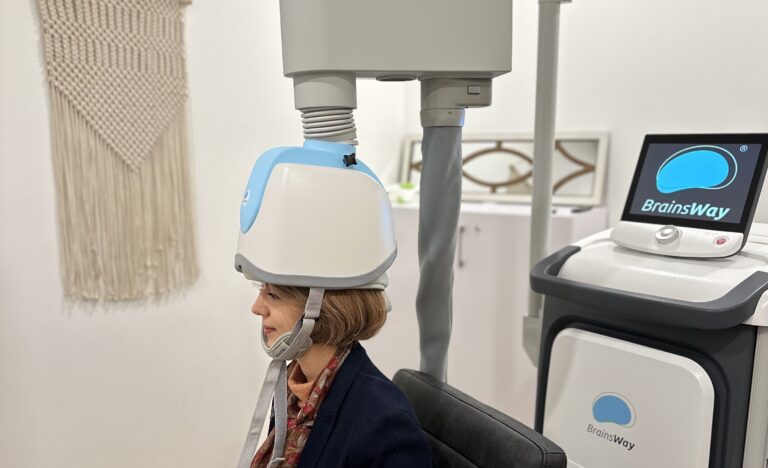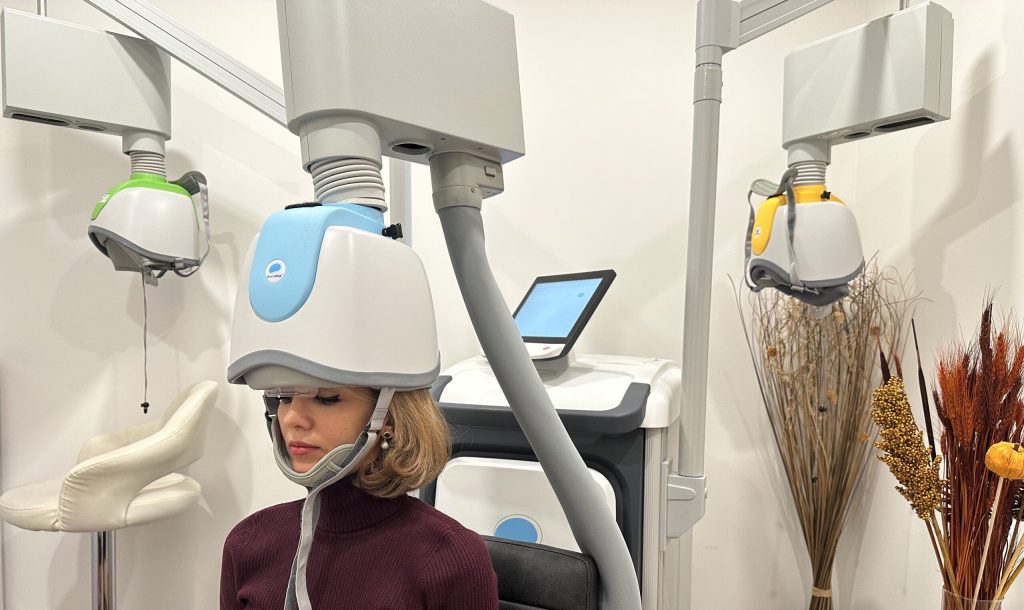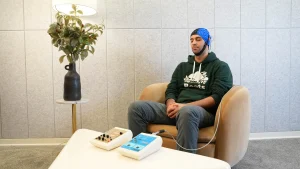Transcranial Magnetic Stimulation (TMS) is a non-invasive treatment that directs magnetic energy pulses at the specific regions of the brain that are involved in mood control. The pulses pass painlessly through the cranium (skull) and stimulate brain cells, which can improve communication between various parts of the brain. TMS is most commonly used to treat depression in people for whom antidepressants have had no effect.
History
As with many scientific discoveries, the principles of TMS were discovered many years prior to the invention of the first TMS device.
In 1831 famous physicist Michael Faraday discovered that if a magnet is applied to a material that conducts electricity, a flow of electric current results. Fast forward to 1938, when ECT (electroconvulsive therapy) was introduced as a treatment for major depression. For a time, ECT was the treatment of choice when all other attempts at alleviating the symptoms of major depression failed. ETC causes seizures in the brain and is administered under general anesthesia.
Although ECT may relieve depression, it has severe side effects, such as memory loss and a decrease in mental clarity (“brain fog”). It has often been thought of as a cruel, crude attempt to rid a person of depression, as so many times the personality is permanently changed. (The procedure was scandalous in the movie “One Flew Over the Cuckoo’s Nest.”)
In 1985, Anthony Baker at the University of Sheffield in England began exploring the use of magnetic fields to change electrical signaling in the brain. Shortly afterward he introduced TMS to the world. Many clinical trials followed, and in 2002 Canada approved TMS as a treatment for depression.
Your Brain
The human brain is made up of billions of cells called neurons. An electrical charge flows between them, carrying chemical “messages” from one to the next. Teamwork among neurons is essential for the neural network to perform at its best.
If there is a breakdown in the communication system along the neural network, a domino effect is created, and neurons cease to function as they should. This breakdown can affect many parts of the brain, including the area of the brain responsible for mood control. Severe depression can result.
Brain scans of people who are depressed show that some areas of the brain have less electrical activity than the brains of non-depressed individuals. This is particularly true in the pre-frontal cortex—the area of the brain just behind your forehead, which is the center of mood control.
How TMS Works
TMS does not require anesthesia and it doesn’t involve surgery. No “down time” is required after a session. You can return to normal activities, including driving, immediately.
Before your first TMS session, your doctor will need to identify the best place to put the electromagnetic coil on your head and the best dose of magnetic energy for you.
During a TMS session, you will sit in a comfortable chair and insert earplugs (the procedure is rather noisy!). The coil is placed against your scalp in the predetermined spot.
The coil painlessly delivers a magnetic pulse that stimulates nerve cells in the prefrontal cortex. The pulse activates portions of the brain that have become less active and have contributed to depression.
Your session will last anywhere from 20 to 40 minutes, although some newer devices require sessions as short as 3 minutes. You will hear clicking sounds and feel a tapping, knocking, or tingling sensation in your head. You may feel some discomfort in your scalp during the session and for a short time afterward.
You will typically undergo five sessions per week for four to six weeks. It may take a few weeks for you to notice a difference in your depression. Whereas not everyone will have the same response to the treatment, over 50% of people who undergo TMS feel a vast improvement in their depressive symptoms. The effects of the treatment can last up to a year. Some people choose to do maintenance sessions to ward off future symptoms. However, some people find that their depression disappears completely.

Can TMS Help With Other Disorders?
Researchers continue to study TMS to determine if it can alleviate other disorders. Some European countries have already approved TMS for the following conditions:
- Pain management
- Pediatric depression
- Bipolar disorder
- Obsessive-compulsive disorder
- Nicotine addiction
- Post-traumatic stress disorder
- Stroke rehabilitation
- Parkinson’s Disease
- Alzheimer’s Disease
- Chronic Pain
Is Everyone A Candidate For TMS?
Since TMS uses magnetic energy, it is not suitable for people who have metal in their head or neck, with the exception of braces or dental fillings.
Other objects that would prevent TMS treatment include:
- Aneurism clips
- Stents
- Deep brain stimulators
- Metallic ear or eye implants
- Shrapnel or bullet fragments
- Pacemakers
Other factors that may exclude you from TMS are:
- Certain other mental health disorders
- Substance misuse
- Psychosis
- Brain damage from illness or injury
- Brain tumor
- Stroke
Promising Treatment
TMS is a promising treatment for those whose depression has been relentless. It’s important to note, however, that while your depression may be the result of an imbalance in your brain, it may have been made worse by your inability to function while being depressed. Often those who are depressed stop taking care of their health, sleep patterns, hygiene, diet, and relationships. TMS can increase your energy level, enabling you to improve areas of your life that depression has caused you to neglect.
Elumind Centres for Brain Excellence is an integrated mental health centre offering solutions that can help you with your mental/brain health needs. To start your journey, book your FREE 15-MINUTE PHONE CONSULTATION. We are here for you.








